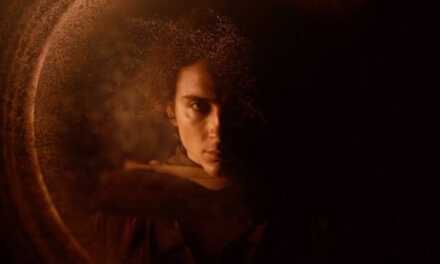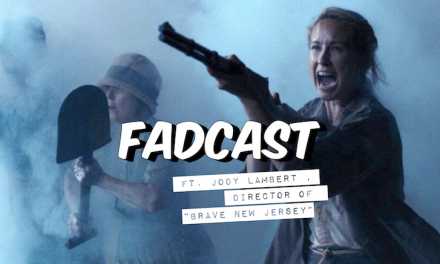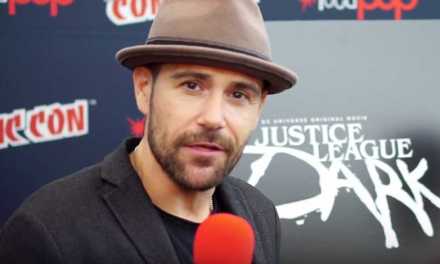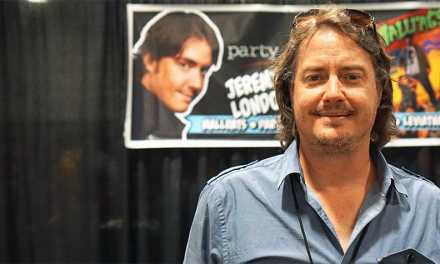
Mora Stephens Talks “Zipper,” the Family Business, and Modern Sex Scandals
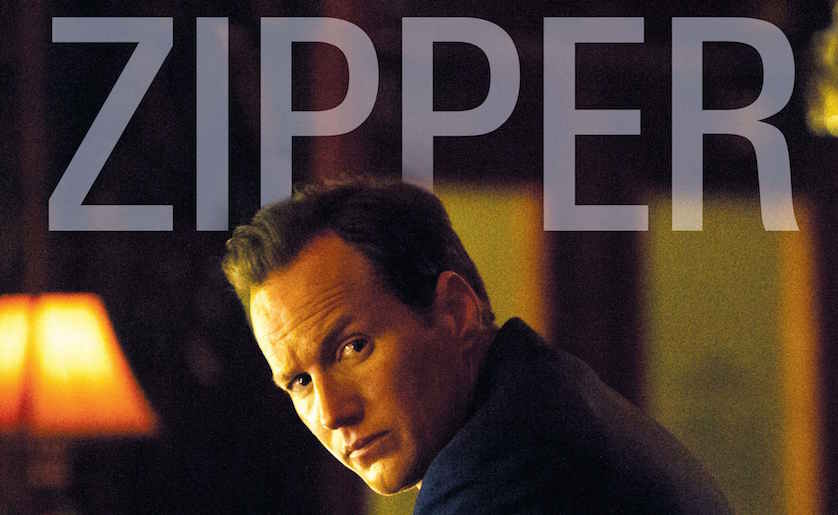
In a FilmFad.com exclusive interview, Pooya chats with “Zipper” co-writer and director Mora Stephens about her new sexual thriller and the family business.
That’s right FadFans, join us as we chat with Mora Stephens about everything from working with Co-Writer/Editor/Producer/Husband Joel Viertel on “Zipper,” to the elements of a modern high-profile sex scandal.
So, without further ado… here is an exclusive glimpse into the mind of Mora Stephens.
FilmFad:
Mora, you directed the film and co-wrote it with your husband Joel Viertel making this project a real family affair. Seems like a dream scenario. How was it taking the work home with you?
Mora:
We’ve been married for thirteen years and we collaborated on my first feature too, “Conventioneers.” I love working with Joel. For this project in particular, because I really wanted to get inside Sam’s head and approach this subject with empathy and without judgement, one of the first things I did was go to Joel and say, will you write this with me? He also edited the movie and was a producer on it, so it was great to have a collaborator through the whole process. We had our daughter out at the set as much as we could.
FilmFad:
How did you come up with this idea? What was “Zipper” born from?
Mora:
It started out a fascination with political sex scandals. Particularly the way in which men and women use them differently. I was fascinated by who condoned so and so’s actions, or condemned them, or had some immediate strong emotional reaction to it. But, the question at the center of it was always why’d he do it. And also I was always wondering why do we keep being surprised by this, over and over again shocked by this. I wanted to take it back to the origin of it, back to where it could have all started. So pulling from a lot of real life scandals, but starting this character on the page with Joel and having it come alive with Patrick [Wilson], making a fictional character going through that journey. Going through the very early stages of addiction and sort of looking at where that could have started.
FilmFad:
The scandal that Patrick Wilson’s Sam Ellis is, unfortunately for the state of our society, very believable. How did you research for the character more in-depth?
Mora:
I think it’s very difficult for people to talk about addiction and look at addiction. So, that was sort of my approach of looking at if from the very beginning. Trying to create a character that was not so different from you and I, so that you would hopefully go with him down the steps, down the rabbit hole. But, not start from a place of him already being this kind of freak you cant relate to. By the end of the movie he goes and does really bad bad things, but you hopefully start the movie from a place of even if your not him you might know somebody like him. I think in the great range of political sex scandals there’s some similarities, but they’re all very different. There are some where you might have know that was part of who they were and there’s others were you never saw that coming. So I wanted him to be one of those guy’s, where even his wife really trusted him.
FilmFad:
The jargon was certainly of the profession, was it difficult balancing real life lingo versus a cinematic presentation that would be easier to digest?
Mora:
That was fun. In creating that character who is an assistant U.S. Attorney and he’s working with Chris McDonald, who plays the U.S. Attorney, I hung out with several assistant U.S. Attorney’s in Los Angeles who helped me kinda understand the whole world. The specific language, Jargon and rules to that world. I guess I was interested in it in terms of somebody who views the world in black and white. I have another lawyer friend who isn’t a prosecutor, but who was saying kind of what Jeannie says in the movie talking about why she doesn’t become a prosecutor. In terms of I can’t view this world in black and white like they do, of good and bad because I always see the good in people, even the people who’ve committed crimes. I think that was part of why I gravitated towards making him a prosecutor at the beginning, because I was interested in that kind of person who views the world in a very clear system of good and bad until he himself starts committing crimes and it unravels, the whole process unravels his moral compass.
FilmFad:
Speaking of unraveling his moral compass, the agency girls weren’t the typical run of the mill cinematic bimbos, they instead displayed cross-sections of the human experience. Did you intend to make the audience feel for the call girls? What did you hope to achieve by making them more endearing and vulnerable?
Mora:
That’s my approach to story telling I think. With each character I’m looking for what feels real. I like to put each character with empathy, with good in them and also the flaws in them. That’s why the casting was so delicate and important to make each of those characters feel unique and special. One our consultants for the movie was Mona Fortuna who plays the voice Mona, the booker in the movie. She in her past life really was a booker for a very big escort agency in New York, and she was pulling from her old notes. And also improving with patrick in that scene, we recorded that phone call live. She also worked with Alexandra Breckenridge who plays Christy and Penelope Mitchell who plays Laci. The type of escorts that she [Mona] was working with were that type of girlfriend experience, where they don’t feel like prostitutes they just feel like some kind of fantasy girlfriend. They would recruit people who had never been prostitutes before, or who are beautiful models, actresses, waitresses, you know basically vulnerable young girls. So that was supposed to show that world. Part of my approach of telling this story as a women is not only to get inside Sam’s head, but also make sure all the female characters feel real and strong and have their own life on screen.
FilmFad:
Alexandra Breckenridge gave a deep and seductive performance as Christy. How important do you think showing her depth and nurturing quality was to the story being believable?
Mora:
Oh yes, that was definitely some of the language that Alexandra and I were talking about. She’s nurturing, gentle, kind of tempering. Even-though Sam has this great family life and all these people around him that believe him, everything is sort of ramped up until that moment when time slows down and we are in that room with him. There is the first real intimacy that we’ve seen him have is with this total stranger. I think that surprises him and hopefully surprises the audience. So much of that is Alexandra. With Lena being so smart as Jeannie, as his wife, it was really important to have Alexandra as Christy, because I didn’t want it to feel like he’s just gone to some empty vessel.
FilmFad:
Penelope Mitchell’s lacy is in one of the most painful scenes where Sam seems as though he is about to revert back to his higher code of morals, only to find out he has completely spiraled down the drain. Was this Sam’s rockbottom moment of the film?
Mora:
Yes. I think for Patrick, Penelope and myself the scariest scene heading into shooting, but it was also the reason we wanted to make the movie. They both went way off the cliff in an amazing way in that scene, I’m very grateful to them. I’ve had also recurring addicts watch this movie and really relate to that scene, recovering alcoholics and drug addicts watch that scene and relate to it. That moment when you think you’ve been able to put it behind you and you can’t. Penelope Mitchell is also really an actress that I hope you watch, she’s so talented. With that character you get to see the fantasy side of her in the room and then the normal young women she is underneath that. In real life she is also a completely different person, just this bright spirit and huge talent.
FilmFad:
Do you think that the fantasy and unattainable aspect of pornography dulls real-life sexual experiences? For example, his wife Jeanie often makes advances only to be turned down, then moments later Sam is either masturbating or contemplating calling the agency.
Mora:
A clue early is when you watching Sam and his early porn habit. That scene is meant to be interpreted a couple of different way. Either it’s that he has this porn addiction, and that’s part of the potential of why he goes down this path, or it’s also meant to be a scene that can hopefully be relatable for people watching the film. Where his dark side is not so different from somebody watching, It’s meant to be an “Oh he’s like me” scene and also clue into the potential for addiction. I think all of the little white lies, the little ways which he lies to wife to get off the phone, you know all the little things that we think aren’t so bad can start to add up and start to mess with your head.
FilmFad:
When engaging in sexual deviance, Sam Ellis goes by the alias Bob Fisher – is that a nod to something or someone in particular?
Mora:
Oh, good question and good catch. In the longer version of the movie, where I shot the entire script, his main rival in the courthouse was this defense attorney Bob Fisher played by Bryan Batt, who was amazing. They had the very first courtroom scene that we see him in with Dianna Agron. It’s a case that’s pending and the defense attorney in that is one that is sort of his main arch nemesis. So he uses his name when he says he’s a lawyer, because he also creating lies that are similar enough to who he is. So that’s who Bob Fisher is, but then we kept trimming and trimming and trimming the movie to make it leaner and faster. There’s a bunch of little bits that got cut. Although a lot of the deleted scenes will be on the DVD and iTunes, including a really great scene between Patrick and Dianna late night at his office [Starts Laughing].





